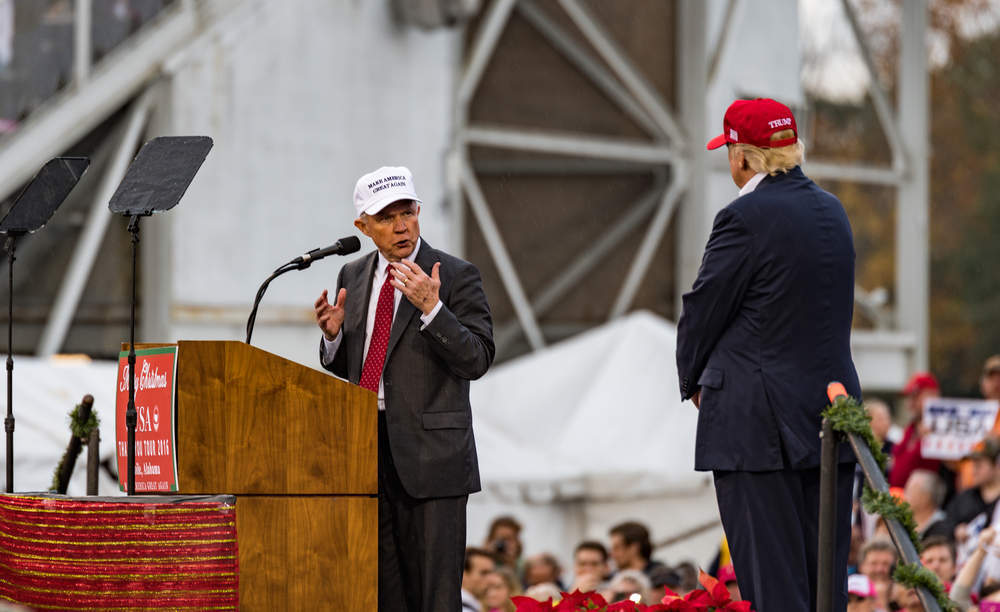
US attorney general Jeff Sessions went before the Senate Intelligence Committee yesterday to answer allegations he had undisclosed meetings with Russian officials.
Though by most accounts, Sessions said very little.

Access deeper industry intelligence
Experience unmatched clarity with a single platform that combines unique data, AI, and human expertise.
“Your silence speaks volumes,” noted Democrat senator Martin Heinrich.
Sessions’ appearance was part of a larger investigation into possible collusion between president Donald Trump’s campaign and an alleged Kremlin plot to influence the 2016 election.
Public officials are usually adept at the art of evasion, but Sessions proved a master of the art; unable to recall, unwilling to say and offended by the “appalling and detestable lie” he saw at the heart of the collusion accusation.
This performance should not come as a surprise however.

US Tariffs are shifting - will you react or anticipate?
Don’t let policy changes catch you off guard. Stay proactive with real-time data and expert analysis.
By GlobalDataScott Lucas, professor of American studies and international politics at Birmingham University explains:
If you expected that we were going to have a big blockbuster revelation, you had the wrong end of the stick going into this. It was always going to be what Sessions did.
Lucas — a native of Alabama, where Sessions served most of his career — thinks the attorney general’s strategy is to stonewall the investigation until it is buried or discredited.
He’s used these tactics before on other issues. It’s basically a filibuster, if it was on the floor of the senate. They’re trying to talk this out.
Perhaps because of this lack of substance, much of the focus today is on Sessions’ use — or non-use — of executive privilege when refusing to give details of conversations he may have had with president Trump about the Russia inquiry.
What is executive privilege?
Executive privilege allows a member of the executive branch to withhold information on national security grounds.
The most infamous example of its use was former president Nixon’s attempt to keep Oval Office tape recordings from coming out during the Watergate investigation.
Nixon lost the case, unable to prove there was a pressing national security imperative at stake.
A similar argument could foil any current White House attempt at executive privilege.
According to Lucas:
I doubt a court would find a national security imperative in this case if Trump tried to invoke executive privilege. The national security imperative actually can be argued, and I’m sure those opposing Trump will argue it, to work the other way. The imperative is we need to know whether there was a threat to national security by the Russian interference in the 2016 election.
Though executive privilege is open to use by anyone in the executive branch, it is commonly understood to be something presidents do, not attorneys general.
Perhaps this is why Sessions denied he was doing it at yesterday’s hearing, as an exchange with senator Mark Warner shows:
WARNER: Just so I understand, is (sic) that mean you claim executive privilege?
SESSIONS: I’m not claiming executive privilege because that’s the president’s power and I have no power there.
Later in the hearing, senator Angus King pressed Sessions on what exactly he was doing with executive privilege.
KING: You testified a few minutes ago ‘I’m not able to invoke executive privilege. That’s up to the president.’ Has the president invoked executive privilege in the case of your testimony here today?
SESSIONS: He has not.
KING: Then what is the basis of your refusal to answer these questions?
SESSIONS: Senator king, the president has a constitutional —
KING: I understand that, but the president hasn’t asserted that. You said you don’t have the power to exert executive privilege so what is the legal basis for your refusal to answer the questions?
SESSIONS: I’m protecting the right of the president to assert it if he chooses and there may be other privileges that could apply in this circumstance.
Pre-emptive executive privilege
“What Sessions did was pre-emptive executive privilege” said Lucas.
Trump has not invoked it yet, (but) he could well invoke it, especially if he’s called upon to testify, but we were certainly not at that point when it was invoked at (yesterday’s) testimony.
This is murky territory — it’s not clear whether Sessions was actually invoking executive privilege, or simply referring to it.
There are potential legal ramifications to that difference, but Lucas said it probably won’t come to that:
At this point a legal case would take a hell of a long time, and politics is moving so quickly that I think it’s the political side of this that’s important.
By at once invoking and not invoking executive privilege, Sessions is just adding a new strategy to his obstructionist playbook.
Lucas explained:
The question here is not whether Sessions was invoking executive privilege in his role as attorney general. He didn’t say ‘Oh, I can’t tell you this because I have a national security reason, I can’t reveal it to you.’ What he said is, ‘I don’t know if the President is going to invoke executive privilege so I can’t say anything in advance of that’. No-one’s ever tried that before, and that’s what’s different in this case.







